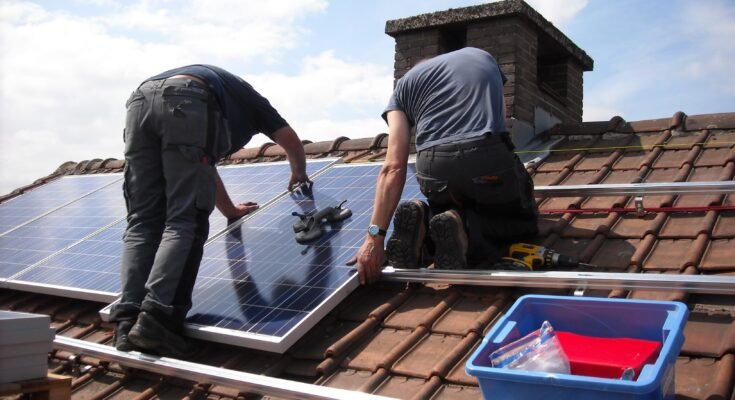Solar Energy: Why People Are Turning to the Sun for Power
Solar energy is rapidly becoming one of the most popular and sustainable energy solutions across the world — and Pakistan is no exception. With rising electricity bills, frequent power outages, and growing environmental concerns, more people are looking toward solar energy as a long-term, cost-effective solution.
In this article, we’ll explore why solar energy is gaining traction, the price per kilowatt in Pakistan, the leading solar companies, future trends, and how maintenance affects performance.
Why Are People Shifting to Solar Energy?
The shift to solar energy is more than just a trend — it’s a global movement toward cleaner, cheaper, and more reliable power. In Pakistan, this shift is particularly significant due to energy shortages, expensive electricity, and climate change.
Rising Electricity Costs
Electricity prices in Pakistan have surged over the last few years. With regular tariff hikes and additional taxes, many households and businesses are struggling to pay their energy bills. Solar energy offers a way to cut those costs dramatically. Once installed, a solar system provides free power from the sun, reducing your dependency on the national grid.
Load Shedding and Unreliable Grid
Frequent power cuts in both urban and rural areas are another reason people are switching to solar energy. Having a solar setup — especially with batteries — provides backup power, ensuring uninterrupted electricity for homes, offices, and even hospitals.
Environmental Awareness
As global awareness about climate change grows, many people want to reduce their carbon footprint. Solar energy is a clean, green alternative that doesn’t emit harmful greenhouse gases, making it an environmentally responsible choice.
Cost per Kilowatt in Pakistan
One of the most common questions is: how much does solar energy cost in Pakistan?
Price per Kilowatt (kW) in 2025
As of 2025, the average price of solar installation in Pakistan ranges from PKR 180,000 to PKR 240,000 per kilowatt (kW). This includes the cost of solar panels, inverter, mounting structures, wiring, and installation services.
Here’s a rough breakdown for residential systems:
| System Size | Average Cost (PKR) | Units Per Day |
|---|---|---|
| 3 kW | 550,000 – 700,000 | 12–15 units |
| 5 kW | 800,000 – 1,100,000 | 20–25 units |
| 10 kW | 1.6M – 2.2M | 40–50 units |
Prices may vary depending on panel quality, inverter brand, warranties, and additional features like battery backup or net metering.
Leading Companies in Pakistan
Choosing the right solar company is crucial for a reliable and efficient setup. Here are some of the top solar energy companies in Pakistan based on customer reviews, experience, and service quality.
1. Reon Energy
Reon is one of the largest and most trusted solar providers in Pakistan, especially for industrial and commercial solar projects. They offer high-end solar solutions with long-term maintenance plans.
2. Premier Energy
Known for residential and small commercial systems, Premier Energy has a strong reputation for affordability and customer service. They are also certified for net metering installations.
3. SkyElectric
SkyElectric offers smart solar energy systems with real-time monitoring, hybrid inverters, and backup options. They are popular among tech-savvy users who want detailed control over energy usage.
4. Tesla Industries
Not related to Elon Musk’s Tesla, but a leading Pakistani brand offering quality solar inverters and installation services across the country. They have a wide dealer network and strong customer support.
Solar Energy: A Bright Future Ahead
The future of solar in Pakistan looks very promising. With declining panel prices, government incentives, and increasing public demand, solar is on its way to becoming a mainstream energy source.
Government Policies and Net Metering
Pakistan’s Alternative Energy Policy encourages homeowners and businesses to adopt renewable energy. Net metering, regulated by NEPRA, allows users to sell excess electricity back to the grid, turning solar panels into income-generating assets.
As of 2025, net metering applications have increased by over 30%, showing how people are not only using solar for savings but also as a smart investment.
Innovation and Efficiency
Solar panel efficiency has improved significantly. New technologies like bifacial panels (which absorb sunlight from both sides) and perovskite solar cells are pushing performance boundaries. Battery storage systems, like lithium-ion and flow batteries, are also getting cheaper and more accessible.
Solar Energy Maintenance: Is It Important?
Yes, maintaining your solar energy system is essential for ensuring long-term performance and return on investment.
Key Maintenance Tasks
- Cleaning Panels: Dust, bird droppings, and pollution can reduce efficiency. Clean panels every 2–3 months using soft water and a non-abrasive cloth.
- Inverter Check: Make sure your inverter is working properly. It usually shows error messages or lights in case of issues.
- Battery Care (if installed): Keep batteries in a ventilated, shaded area. Check electrolyte levels if using lead-acid batteries.
- Wiring Inspection: Occasionally inspect wiring for damage, especially after heavy rain or storms.
Many companies offer AMC (Annual Maintenance Contracts) that include scheduled servicing, performance checks, and cleaning.
Pros and Cons of Solar Energy
Let’s briefly look at the advantages and challenges of using solar energy:
✅ Pros:
- Reduces or eliminates electricity bills
- Environmentally friendly
- Increases property value
- Low maintenance after installation
- Eligible for net metering
❌ Cons:
- High upfront cost
- Requires space (preferably on the roof)
- Dependent on weather and sunlight hours
- Battery storage is still expensive
However, most homeowners find that the benefits of solar system outweigh the drawbacks, especially over a 10–20 year period.
Tips for Switching to Solar sytem
Thinking of going solar? Here are a few helpful tips:
- Assess Your Electricity Needs: Review your electricity bill to understand how much power you consume monthly.
- Choose the Right System Size: Oversizing or undersizing affects performance and cost.
- Go for Tier-1 Panels: Brands like Canadian Solar, Longi, and JA Solar offer high efficiency and better warranties.
- Use a Trusted Installer: Don’t compromise on installation quality to save a few thousand rupees.
- Apply for Net Metering Early: The process can take a few weeks, so apply soon after installation.
Frequently Asked Questions About Solar Energy
Is solar energy reliable in Pakistan?
Yes. Pakistan receives abundant sunlight — 7 to 9 hours daily in most regions — making it ideal for solar energy systems.
Can I completely go off-grid with solar?
Technically yes, but it requires a large system and expensive battery storage. Most users prefer grid-tied systems with net metering for reliability.
How long do solar panels last?
Most panels last 25–30 years with minimal efficiency loss. Inverters typically last 10–15 years, while batteries may need replacement every 5–10 years.
What happens on cloudy days?
Solar panels still produce energy, but at reduced levels. Hybrid systems with batteries or grid backup are recommended in areas with unpredictable weather.
Conclusion: Is Solar Energy the Right Choice?
Absolutely. With rising electricity costs, power instability, and environmental urgency, solar energy stands out as the most viable long-term solution. In Pakistan, where the sun shines most days of the year, tapping into solar energy is both smart and sustainable.
Whether you’re a homeowner looking to reduce bills, a business wanting energy independence, or a farmer needing power for irrigation — solar system something valuable to offer.
Now is the time to take control of your energy future. Invest in solar today and enjoy decades of clean, affordable power.




